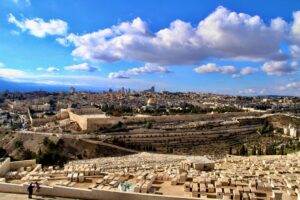First, I need to remind you that before we can pray effectively for Israel’s restoration we need to carry a burden for Israel. And what kind of a burden is that? It is a burden of sorrow and grief for Israel and the Jewish people. The Apostle Paul carried such a burden. Let’s read his words in Romans 9:1-4:
I tell the truth in Christ, I am not lying, my conscience also bearing me witness in the Holy Spirit, that I have great sorrow and continual grief in my heart. For I could wish that I myself were accursed from Christ for my brethren, my countrymen according to the flesh.”
Paul confesses his feelings concerning Israel, saying, “I have great sorrow and continual grief in my heart.” He carried a continual burden of sorrow and grief for Israel.
There is a popular kind of preaching that says that believers ought to always be happy and feel good. But that’s not what we find in the Bible. Even God carried a burden of grief for Israel. And we’re supposed to emulate the character of God, aren’t we?
The psalmist wrote concerning God’s burden of sorrow and grief toward Israel in Psalm 78:40: “How often they provoked Him in the wilderness, And grieved Him in the desert!” God’s burden of grief was not a brief passing thing. In Psalm 95:10 God says, “For forty years I was grieved with that generation, and said, ‘It is a people who go astray in their hearts, And they do not know My ways.”
Yeshua also carried a burden of sorrow and grief for the Jewish people. We read in Luke 19:41-42, “Now as He drew near, He saw the city and wept over it, saying, if you had known, even you, especially in this your day, the things that make for your peace! But now they are hidden from your eyes.” Yeshua, the great High Priest of the New Covenant, carries the burden on His shoulders, just as the high priest of the Old Covenant had the names of the tribes of Israel upon his shoulders and breast when he drew near to God. And we are to also carry Israel as a burden upon our shoulders as priests and co-laborers with the Messiah. As the Lord carries a burden of sorrow and grief, so should his servants.
David wrote in Psalm 119:136: “Rivers of water run down from my eyes, Because men do not keep Your law.” Jeremiah the weeping prophet said in Jeremiah 13:17, “My eyes will weep bitterly and run down with tears, because the LORD’s flock has been taken captive.”
Israel remains in an unrestored state and must never be taken lightly. The reality of Israel’s spiritual exile must become our burden—a burden that weighs heavily on the heart. There are Christian supporters of Israel that walk around too light-heartedly—too unburdened. They have a head-in the clouds, romantic, and grossly unrealistic view of Israel and the Jewish people as though being Jewish in and of itself means they are closer than everyone else to the throne of God. Surely with their daily prayers in the synagogue, even on the buses, with their proximity to the Western Wall, and with their ability to speak and read the holy Hebrew language of the Bible…surely that means they have some unique access to God.
But in Paul’s day the Pharisees, the forerunners of today’s orthodox Jews, were just as pious then as now. Yet, this didn’t lessen Paul’s heavy burden of “great sorrow and continual grief.” For he knew that their piety was no guarantee of their salvation. Paul says concerning the religious in the next chapter in Romans 10:2, 3, “For I bear them witness that they have a zeal for God, but not according to knowledge. For they being ignorant of God’s righteousness, and seeking to establish their own righteousness, have not submitted to the righteousness of God.” And if you think that’s just Paul’s biased reaction to his former pharisaic colleagues who were now persecuting him for this faith, listen to what Yeshua said to his disciples concerning the religious of his day in John 16: 3: “And these things they will do to you because they have not known the Father nor Me.”
So now is not the time for over-the-top triumphalism—as if Israel is all but restored now that the Jewish people have the Promised Land. It’s too soon to wave the victory flag. The greatest battle of the Jewish people is not what has been fought on the battlefields and won in 1948, 1967, or 1973; the greatest battle that Israel has yet to wage and win is the battle for the mind—the battle for truth and faith; the battle that Israel will win this time through surrender—surrender to God and to His Son.
I’m a Zionist. I believe that God is restoring Zion in our day—the literal physical land of Israel and city of Jerusalem He is putting back into the hands of his covenant people. But I believe it is still premature to be “triumphalist Zionists.” I believe we need to increasingly become burdened Zionists.
There are times when the Lord lets us unload our burden and join in the hurrah dance of victory, but our dancing must not go too far. If we’re going to have the heart of God, the heart of Yeshua, and the heart of the apostle Paul, we need to do more crying than dancing. Because until God has won the hearts of His people, His precious inheritance, the victory is incomplete.
Carrying the burden through intercessory prayer
So I’ve talked about the burden—the burden of grief and sorrow. Now I’m going to talk about the proper means by which we carry this burden. Paul says in the first verse of the next chapter, Romans 10: “Brethren, my heart’s desire and prayer to God for Israel is that they may be saved.” It is not enough to feel bad for Israel’s current unrestored state of affairs. We are called to do something about it. God has called his saints to stand in the gap in prayer until Israel’s restoration will be completed. Yes, we must preach the gospel to see a harvest, but we must also bathe the soil in prayer so it is ready to receive the seed of the gospel.
Earlier I spoke about Israel’s greatest battle—a battle for the mind, the battle for truth and faith. In S.D. Gordon’s book, Quiet Talks on Prayer, he considered the earth to be the battlefield in prayer, and prayer as a “war measure”…something that will not come as much of a surprise for most of you who are reading this. He defined it this way: “Prayer is man giving God a footing on the contested territory of this earth. The man in full touch of purpose with God praying, insistently praying – THAT man is God’s footing on the enemy’s soil. The man wholly given over to God gives Him a new headquarters on the battlefield from which to work out. And the Holy Spirit within that man, on the new spot, will insist on the enemy’s retreat in Jesus the victor’s name.”
Prayer for Israel is not an option. It is a command. Psalm 122:6 says, “Pray for the peace of Jerusalem.” How many of you know that real peace is not merely the absence of war. Real peace, complete peace, is peace with God. So when we pray for the peace of Jerusalem we’re not just praying that there will be no terrorist bombings, but we are praying that the Prince of Peace brings peace to the hearts of the Jewish people who claim Jerusalem as their capital.
I say it again: Prayer for Israel is not an option—it is a command. Isaiah 62:6,7 gives this command: “You who make mention of the LORD, do not keep silent, and give Him no rest till He establishes and till He makes Jerusalem a praise in the earth.” How many of you know, that Jerusalem cannot become a praise in the earth, until it’s citizens become a people of praise. And they cannot become a people of praise until they praise Adonai; until they praise the Lord, Yeshua their Messiah.
Praying for Israel is not just something we do in the dozens of prayer meetings for Israel that go on in Jerusalem every week—a number of those involving our congregation. Our prayer for the Jewish people must be something ongoing that permeates our public meetings; but we offer up prayers while we ride the buses or walk the streets. And prayer for Israel ought to permeate our private devotional life. As Isaiah 62 says, we are to give God “no rest till He established and till He makes Jerusalem a praise in the earth.”
None of us has prayed as consistently as we should for Israel. Andrew Bonar, the 19th century preacher and man who carried a prayer burden for Israel’s restoration one day wrote down these words in August, 1850: “Felt great sorrow at not having prayed for the Jews or spoken for them in public today.”
Andrew Bonar was a friend and colleague of another man by the name of Andrew Murray McCheyne. a Scottish minister who was educated at the University of Edinburgh. The death of an older brother caused him to look for “a brother who cannot die,” whom he found in the Lord Jesus. At his own church, St. Peter’s in Dundee, McCheyne, in spite of frequent sickness, maintained a rigorous regimen of prayer, Bible study, visitation, and sermon preparation. His sermons are still in print and valuable. McCheyne had an interest in reaching Jews, and in 1839 he traveled to Israel with the idea of recommending to the church of Scotland to begin a ministry among the Jewish people.
Whilst he was in Israel, revival broke out in St Peter’s under the ministry of William Chalmers Burns. On his return McCheyne was confronted by a dramatically changed situation. A grass-roots spiritual awakening, or revival as some would describe it, This revival was to continue through the remaining years of McCheyne’s life.
Well, McCheyne’s godly influence and ministry, watered by many tears, spread from St. Peter’s to all of Scotland. McCheyne’s fruitful ministry is often attributed to his devotional life. He made prayer, meditation and self-discipline key aspects of his work throughout his life. His usual daily pattern was to rise at 6:30 am and spend two hours in private prayer and meditation including an hour devoted to the Jews. Some Scottish presbyterians are convinced that it was McCheyne’s burden for Israel and his daily prayer for Israel’s restoration that opened the way for the great Scottish revival.
We once again need what Robert Murray McCheyne had—what the apostle Paul had. We need to have a burden for Israel, aburden that causes us to pray for Israel’s restoration and salvation.
Many times we pray not knowing for sure that we are praying according to the will of God. But when it comes to praying for Israel’s salvation we should have no doubt concerning God’s will. For it is God’s will that all Israel be saved. Romans 11:26, 27 declares: “And so all Israel will be saved, as it is written: ‘The Deliverer will come out of Zion, And He will turn away ungodliness from Jacob; For this is My covenant with them, when I take away their sins.’”
Models of Intercessory Prayers for Israel - Moses: Deut.9:18, “And I fell down before the LORD, as at the first, forty days and forty nights; I neither ate bread nor drank water, because of all your sin which you committed in doing wickedly in the sight of the LORD, to provoke Him to anger. “For I was afraid of the anger and hot displeasure with which the LORD was angry with you, to destroy you. But the LORD listened to me at that time also. “And the LORD was very angry with Aaron and would have destroyed him; so I prayed for Aaron also at the same time…. “Thus I prostrated myself before the LORD; forty days and forty nights I kept prostrating myself, because the LORD had said He would destroy you. “Therefore I prayed to the LORD, and said: ‘O Lord GOD, do not destroy Your people and Your inheritance whom You have redeemed through Your greatness, whom You have brought out of Egypt with a mighty hand. ‘Remember Your servants, Abraham, Isaac, and Jacob; do not look on the stubbornness of this people, or on their wickedness or their sin, ‘lest the land from which You brought us should say, “Because the LORD was not able to bring them to the land which He promised them, and because He hated them, He has brought them out to kill them in the wilderness. ‘Yet they are Your people and Your inheritance, whom You brought out by Your mighty power and by Your outstretched arm.’”
The Lord often requires us to intercede before He moves to carry out His promises written in Scripture. We see this in the case of Daniel, who understood the times in which he lived, and God’s purposes for Israel’s salvation. Remember how God promised to bring back the Jews from the Babylonian captivity after seventy years? (Jer. 29:10). He brought them back, in part, because of Daniel’s prayer.





